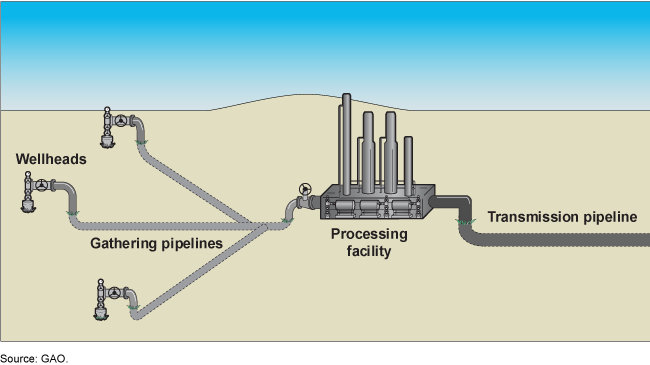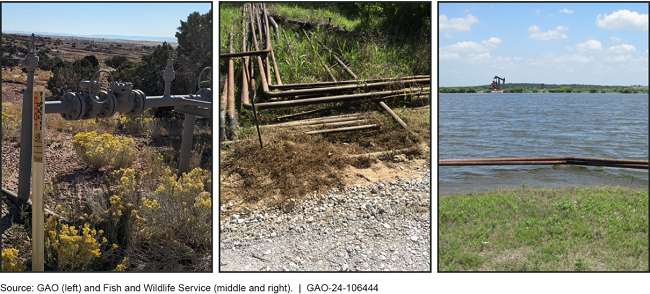Oil and Gas Pipelines: Agencies Should Improve Oversight of Decommissioning
Fast Facts
"Gathering pipelines" carry oil and natural gas from wells to other pipelines or facilities. Many—although an exact number is unknown—are located on federal lands and were installed decades ago. If not taken out of service properly, the pipelines may pose safety and environmental risks—including spills, emissions, or explosions.
In this Q&A report, we look at the challenges several federal agencies face with ensuring the pipelines are safely decommissioned in a timely way. The agencies need better data to identify and prioritize decommissioning those that present the greatest risks.
Our recommendations address this data collection, and more.
Gathering pipeline systems

Highlights
What GAO Found
Gathering pipelines carry natural gas, crude oil, and other hazardous liquids from production wells to processing facilities, refineries, and transmission pipelines. Pipeline operators should decommission gathering lines after oil and gas production has ended to ensure any remaining gathering lines are safe and to restore the land to its natural state. If operators do not decommission gathering lines properly or in a timely manner, they could pose various safety and environmental risks, including spills, emissions, and explosions. For example, in 2017, homeowners accidentally struck an improperly decommissioned gathering line on their property, causing an explosion that killed two people and injured two others.
Examples of Gathering Lines and Associated Infrastructure

Agency efforts to ensure proper decommissioning may be hindered by insufficient bonding, data limitations, and ambiguous requirements. For example, the Bureau of Land Management has detailed data for the more than 95,000 wells on federal leases, but its databases do not include any data for the gathering lines associated with those wells.
While agencies have taken steps to improve the data they have on gathering lines, those steps have been ad hoc. None of the agencies has a documented plan to ensure they are collecting and maintaining the data needed to oversee decommissioning activities. Developing a plan with a timeline for implementing data improvement efforts would provide management the assurance that officials are collecting and maintaining the data needed to oversee decommissioning. Specifically, a documented plan would identify what data are needed, potential sources for the data, timelines to collect or acquire the data, and how best to maintain the data over time, ensuring that they remain current and accessible.
The federal government has previously stepped in to decommission orphaned gathering lines—lines without an identifiable responsible party. However, agencies have limited resources. While the 2021 Infrastructure Investment and Jobs Act provided additional funding, agencies told us that the act's funding will not be sufficient to decommission all orphaned infrastructure. For example, Forest Service officials said that even if all of the $250 million in the act were provided solely to Forest Service, those funds would allow for decommissioning of only 5 percent to 10 percent of the known and expected orphaned infrastructure on Forest Service lands.
Agencies need to analyze the risks associated with gathering lines they oversee. For the four agencies, we found that only the National Park Service has assessed the potential risks of gathering lines it oversees. Assessing risks would allow agencies to adequately prioritize those gathering lines that pose the greatest safety, environmental, or fiscal risks for either oversight attention if lines are active, or decommissioning if lines are orphaned.
Why GAO Did This Study
Oil and gas pipeline operators have installed at least 384,000 miles of onshore gathering lines across the United States. We were asked to review issues related to decommissioning oil and gas gathering lines on federal lands. This report examines the risks associated with gathering lines that are not decommissioned properly or in a timely manner and how agencies oversee decommissioning of gathering lines on federal lands.
We reviewed relevant laws, regulations, policies, and guidance related to overseeing decommissioning pipelines. We also conducted a literature search to assess risks associated with improper decommissioning. We interviewed agency headquarters and field office officials, as well as state agency officials, representatives from the oil and gas industry, environmental advocacy groups, and pipeline safety organizations.
Recommendations
GAO is making nine recommendations, including that agencies develop plans to improve data collection for oversight purposes and identify the gathering lines with the greatest safety, environmental, or fiscal risks to prioritize for oversight and decommissioning. The agencies generally concurred with our recommendations.
Recommendations for Executive Action
| Agency Affected | Recommendation | Status |
|---|---|---|
| Department of the Interior | The Director of BLM should develop a documented plan to ensure the agency collects and maintains the data necessary to oversee the decommissioning of gathering lines. (Recommendation 1) |
Interior agreed with this recommendation. We will update the status of the recommendation when we have more information.
|
| Department of the Interior | The Director of BLM should further specify when gathering lines should be decommissioned following the termination or revocation of rights-of-way. (Recommendation 2) |
Interior agreed with this recommendation. We will update the status of the recommendation when we have more information.
|
| Department of the Interior | The Director of BLM should analyze all gathering lines BLM oversees to identify and prioritize those that pose the greatest safety, environmental, or fiscal risks for oversight and decommissioning. (Recommendation 3) |
Interior agreed with this recommendation. We will update the status of the recommendation when we have more information.
|
| Department of the Interior | The Director of FWS should develop a documented plan to ensure the agency collects and maintains the data necessary to oversee the decommissioning of gathering lines. (Recommendation 4) |
Interior agreed with this recommendation. We will update the status of the recommendation when we have more information.
|
| Department of the Interior | The Director of FWS should analyze all gathering lines FWS oversees to identify and prioritize those that pose the greatest safety, environmental, or fiscal risks for oversight and decommissioning. (Recommendation 5) |
Interior agreed with this recommendation. We will update the status of the recommendation when we have more information.
|
| Department of the Interior | The Director of NPS should develop a documented plan to ensure the agency collects and maintains the data necessary to oversee the decommissioning of gathering lines. (Recommendation 6) |
Interior agreed with this recommendation. We will update the status of the recommendation when we have more information.
|
| Department of Agriculture | The Chief of the Forest Service should develop a documented plan to ensure the agency collects and maintains the data necessary to oversee the decommissioning of gathering lines. (Recommendation 7) |
USDA concurred with this recommendation and will develop a plan for collecting and maintaining pipeline decommissioning data. The estimated completion date is August 20, 2025.
|
| Department of Agriculture | The Chief of the Forest Service should further specify when gathering lines should be decommissioned following the termination or revocation of rights-of-way. (Recommendation 8) |
USDA concurred with this recommendation and stated it will provide agency guidance on when pipelines should be decommissioned. The estimated completion date is August 20, 2025.
|
| Department of Agriculture | The Chief of the Forest Service should analyze all gathering lines the Forest Service oversees to identify and prioritize those that pose the greatest safety, environmental, or fiscal risks for oversight and decommissioning. (Recommendation 9) |
USDA concurred with this recommendation and stated it will create a priority list for overseeing and decommissioning pipelines. The estimated completion date is August 20, 2025.
|
